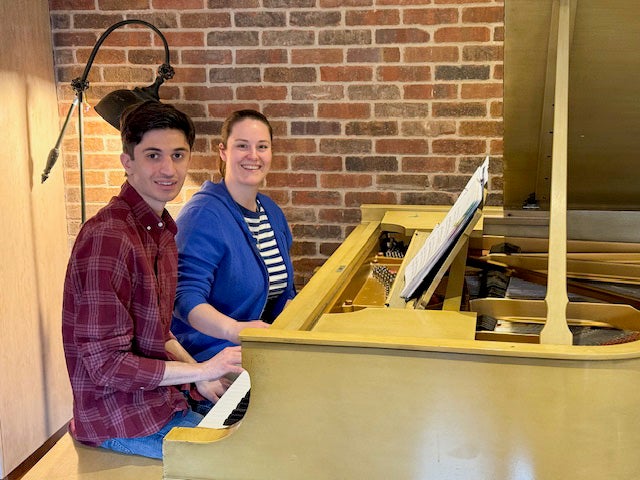Music: more than just a passion

Manoli Katalifos has long had a fascination and love for music, particularly classical music.
“There has always been a connection there,” says his father Nick Katalifos. “He would stop everything when he would hear a classical piece. At 4-5 years old, he could hum pieces by Beethoven, Mozart and Bach from memory.”
Now in his early 20’s and attending the adult education program at Giant Steps School (a partnership with the Adult Education and Vocational Service Department of the English Montreal School Board), Manoli, who is on the autism spectrum, is taking weekly piano lessons, which he has been doing for the past six years under the tutorship of Emily Curtis, the assistant director of Pedagogical Services at Giant Steps. Curtis first met Manoli while working on a research project at the school that would ultimately serve as the basis of her Master’s thesis at Berklee College of Music in Boston.
“As a high school music teacher, I had noticed that many autistic students who struggled in other subject areas were incredible in music,” she said. “They had exceptional abilities, and I wanted to learn more about the science behind music perception and cognition in relation to autism.”
For Manoli, being pitch-perfect is a must. His father says even the slightest off-note would make him upset. Curtis says it is not uncommon for autistic individuals to have particular sensitivities to pitch or rhythm.
“There is a high correlation of perfect pitch and autism far beyond what we find in neurotypical populations - a gift that can bring with it challenges, but also contribute to exceptional musicianship,” she explained.
Curtis says music is a “strength-based” discipline and builds on the interests, passions and talents of students like Manoli.
“He loves music and sitting down at the piano,” said Curtis. “He is capable of learning music just like any other student would want to learn. In a lot of areas of life, he’s defined by autism and what that means in terms of what needs to be adapted. It’s not the case for him with music. It is a strength of his, and it is something he loves to do.”
Katalifos says Manoli’s personality has emerged through music. He happily holds impromptu concerts on the family piano when friends and family stop by for a visit, with a signature bow at the end of each performance. He is amazed by his son’s improved communication skills through music, as showcased by his relationship with his music teacher.
“Playing piano gives him a lot of joy and he takes great pride in it,” he said. “He has a special bond with Emily. He is able to connect with another person and learn from her. He is driven and focused on what she is telling him. It is remarkable to see that connection.”









